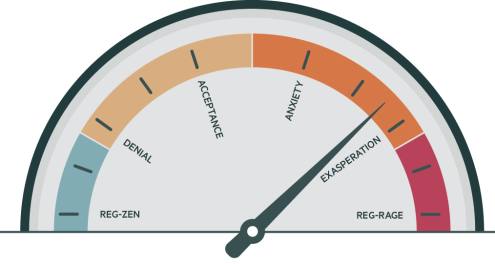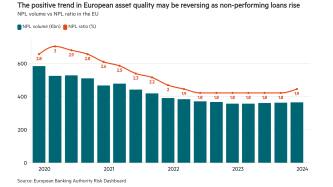The UK Treasury has consulted whether to split up the Financial Conduct Authority and give its responsibility for tackling money laundering and terrorist financing — which it undertakes with a patchwork of other bodies — to an entirely new organisation. This is the final of four options the Treasury put on the table; it will make a decision by summertime.
FCA CEO Nikhil Rathi recently warned the Treasury Select Committee against adopting this final and most extreme option, calling it “disproportionately disruptive”.
But revelations that two of the UK’s largest banks allowed an Iranian petrochemicals company to breach sanctions have underlined calls for a faster overhaul of the UK’s fincrime regime.
Ted Datta, head of Moody’s Analytics’ financial crime compliance practice for Europe, Africa and the Americas, says the front companies used in the case involving Lloyds and Santander UK, as reported by the Financial Times, should have raised questions. Both were clearly red-flagged on Moody’s globally used database, he says.
Lloyds and Santander UK did not respond when asked if they had seen Moody’s red flags.
A regime ripe for renewal
The UK’s standard for wider financial crime policing has been criticised for years. A 2018 review from international standard setter, the Financial Action Task Force, set in motion a slew of consultations from the Treasury, which called for reform of the regime after unearthing “significant weaknesses”.
Since then, there were 473 suspected breaches of financial sanctions between 2022 and 2023, according to records from the Office of Financial Sanctions Implementation, a “significant increase” on the 147 cases between 2021 and 2022.
Detta says that 256,000 — 1 per cent of UK companies — raise the same red flag as the shell companies used by Iran. “The use of shell and front companies is a significant loophole,” he says. As of November 2023, the firm’s shell company analysis flagged more than 21 million risk activities across 472 million companies.
Experts pour scorn on FCA’s solution
The FCA is agitating for the government to resist the final option laid out in its consultation in favour of the third option. Supported by the regulator’s leader Rathi, it would see 22 so-called Professional Body Supervisors — private bodies who supervise legal and accountancy firms — brought under one single public body.
But some compliance experts are sceptical. Matthew Russell, a partner in Ashurst Risk Advisory, says: “As much as I agree with [Rathi’s] argument as to why you would consolidate the professional services sector . . . at this stage of 30 years into the regime, now we’ve got to do something radically different.” He has previously called for the FCA to be overhauled.
A “single regulator that has that line of sight across the end-to-end transaction” is the better option, he argues. “If we do want to get a regulatory regime that’s fit for purpose, then arguably the only way to do that is . . . to have more of a genuine intelligence agency supervisor that is really trying to understand what’s working and what’s not working.”
David Lewis, head of anti-money laundering at Kroll, is also sceptical. He says that UK authorities “have been under-resourced and under-funded”.
“This has left the country susceptible to dirty money passing through its walls. It’s clear the current system of supervision does not work,” he says, calling for change and underlining a “strong case for a new, single dedicated supervisor”.
The case for option 3
The FCA’s preferred option would make “quite complicated regulated entities” that “are finding it very difficult to supervise AML” more transparent, says Russell.
Like the FCA’s Rathi, the Wolfsberg Group, an association of global banks that develops AML industry standards, has pushed for bringing together these disparate Professional Body Supervisors.
This option would also calm fears around too much change, or creating a new regulator “that just doesn’t understand how your business works”, says Russell.
“Politically [it’s the] path of least resistance,” he adds, pointing to the upcoming election as a reason for choosing the “noncontroversial” third option instead of the more radical overhaul.
Bringing sanctions checks into the mix
New complex tactics used to evade sanctions have forced the Treasury to consider giving those 22 supervisors explicit sanctions powers. They could play an “important role in communicating sanctions risks to businesses”, the consultation says.
So far, those supervisors’ sanctions controls are entirely free from scrutiny, says Stephen Lockwood, director of FCR Compliance and a former investigator at the FCA. They are “private organisations that rely on memberships” which may be a conflict of interest, he points out, calling the body that supervises those 22 bodies a “toothless tiger”.
The current patchwork “needs simplifying”, he stresses, but the single national regulator option “is never going to work. You’re never going to be able to create the infrastructure to make it effective. Because the cost is going to be prohibitive,” he says.
Cleaning up sanctions controls
Reforming the existing patchwork of supervision could also strengthen sanctions controls, say experts.
The Treasury’s reform efforts are “part of the same conversation” to give regulators more insights as to who [companies’] ultimate beneficiaries are, says Matthew Long of Quantexa, a firm which checks complex shell company structures for top banks.
“Understanding who your customers are, and understanding all of the controls around who you do business with, is absolutely central to this . . . supervisory transformation,” he adds.
While the remit of the Treasury’s investigation doesn’t cover sanctions, such breaches span interconnected crime networks, says Long.
“It’s never just one channel.” They often show delicate links between regulated entities, he points out — “it goes across channels” — which makes it important to “stitch” different pots of data together to find the networks between various shell companies.
An earlier version of this article appeared in Banking Risk and Regulation, a service from the Financial Times.












